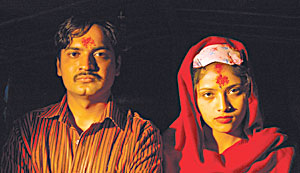 |
In particular, a number of short fiction films-namely, Awaken Eyes by Binod Paudel, Irony by Fidel Devkota and Palush by Sindhu Pokhrel-suggests an exciting new aesthetic movement emerging. These filmmakers' works feel young and bold, ambitious within their modest means, and unabashedly delve into boundary-pushing themes.
In Awaken Eyes, a newly-wed couple share their tiny quarters with the groom's ailing mother in a squatter's camp. There is something inherently humorous in the situation, but it is fundamentally a story of hard circumstance and sexual frustration that elicits pathos effectively.
In a similar vein, Pokhrel's Palush takes the point of view of a young man with a serious physical disability that sequesters him in his room, requiring assistance with even his basic needs. His vista onto the square below with its women bathing and washing, provides the material for his erotic imagination. The focus on the public square, with the camera mimicking the male gaze, peels back the sensual undercurrent and sexual politics behind the everyday without moralising. Its treatment of its subject, even as he deals with his natural desire, is unflinching without being patronising.
Fidel Devkota's Irony which could be said to embody a slacker sensibility of a Nepali sort, only touches on sexuality tangentially, but it also possesses an appealing impertinence towards conventions. Devkota reveals a fine dry wit with his literal illustration of the film's title.
That fluency in the language of film speaks most lyrically in Pooja Gurung's offering. Her Changa is a perfectly executed piece of cinema-captivating, assured and enchanting. It's a simple premise; a boy receives a kite from his father and longs to fly it. Like the best of films that centre on children, Gurung manages to subtly differentiate the child's experience of the world from the adults around him. She elicits performances from her actors that seem utterly natural; you suspect that she had wisely allowed her young protagonist to be himself. Set in the streets of Patan and inside the home of a small family, every frame is a delight to watch with lush cinematography from Pramod Karki.
Gurung herself lends her voice to a charmingly jazz-inflected soundtrack. It isn't an idealised picture of a childhood, and yet captures something genuinely magical. I haven't been so swept away by a piece of work in a long while.
Such a striking line-up should finally put to rest the constant complaining over the quality of Nepali cinema and direct attention to supporting talented independent artists. But will it?
As per usual, documentaries make up the meat of this festival with some impressive entries in the international show case. Jeremy Gilley's The Day after Peace can be either exasperating, na?ve or powerfully inspiring depending on your point of view but is nonetheless an impressive document of one person's attempt to infuse the International Day of Peace with real meaning, reach and practical consequence.
Soma Josson's I Want My Father Back must be one of the political heavyweights this season, tackling the enormous subject of the widespread suicides of debt-stricken Indian farmers. It compresses the interconnectedness of failed policy, agribusiness and the plight of farmers in an incisive and persuasive package-and manages to retain the nuances of its decidedly complicated criticism. Folke Ryden's Full Cover Girl visits Iraq and follows two aspiring women politicians just as Iraq revives its democratic process in an atmosphere of hope and excitement before the country spiraled into mayhem.



